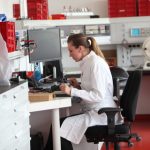
Biomedical engineering centre of excellence established
The University of Birmingham and Southeast University (SEU) have signed a new agreement to develop new biomedical technologies that could help to fight diseases and aid regeneration of the human body. Establishing a Joint Research Institute (JRI) in Biomedical Engineering will allow the partners to work on applied research projects that will use the University … Continue reading Biomedical engineering centre of excellence established

UK and Chinese scientists link on data science project
The University of Birmingham has announced its data science experts have signed an agreement to join forces with one of China’s best and biggest hospitals to gather, organise and analyse patient information under related laws and regulations from both countries and help improve healthcare for thousands of people. Under the leadership of the Centre for … Continue reading UK and Chinese scientists link on data science project

Spinal fluid may predict progression of multiple sclerosis
A study led by the University of Birmingham has found that analysis of fluid in the spine could be used to predict the future progression of multiple sclerosis. Multiple sclerosis (MS) is a condition in which the immune system attacks the nervous system and is the leading cause of non-traumatic disability in young adults, with … Continue reading Spinal fluid may predict progression of multiple sclerosis

Irregular heartbeats can never be considered cured
People with an abnormal heart rhythm that can leave them at a higher risk of suffering from stroke will still need treatment even after their heart rhythm seems to have returned to normal, according to researchers at the University of Birmingham. Atrial fibrillation is the most common heart rhythm disturbance, affecting around 1.6 million people … Continue reading Irregular heartbeats can never be considered cured

Funding to study molecules in exquisite detail
The University of Birmingham has received funding for a powerful new piece of technology called a spectrometer which will allow scientists to better gain insights into the molecular basis of human health, including the progression of cancer and infectious diseases. The University of Birmingham reports the spectrometer, which will operate at a strength around five … Continue reading Funding to study molecules in exquisite detail

Viatem developing rheumatoid arthritis therapeutic target
University of Birmingham Enterprise has announced the formation of a new spinout company, Viatem Ltd, to develop and exploit the therapeutic potential of PEPITEM (Peptide Inhibitor of Trans-Endothelial Migration). The University of Birmingham reports the announcement coincides with the presentation of new research showing that synthetic PEPITEM can prevent or delay the onset of rheumatoid … Continue reading Viatem developing rheumatoid arthritis therapeutic target

Large Hadron Collider technology to help treat cancer
Technology from the ATLAS experiment at the Large Hadron Collider, where the Higgs Boson was discovered, will be used in hospitals to improve cancer treatments that employ proton beam therapy. The University of Birmingham reports their researchers, who designed and built detectors for ATLAS, are using their knowhow from the Large Hadron Collider to create … Continue reading Large Hadron Collider technology to help treat cancer

Microbeads could eliminate infections in burn wounds
Computer simulations of microscopic, protein coated beads that block bacteria from binding to host cells suggest that the microbeads could help reduce or eliminate bacterial infections in burn wounds. Dr Paul Roberts, from the University of Birmingham’s School of Mathematics, and colleagues present their new findings, funded by the BBSRC, in PLOS Computational Biology. The … Continue reading Microbeads could eliminate infections in burn wounds

Type of immune cell that fights viral infections identified
Research led by the University of Birmingham has identified a novel unconventional type of immune cell capable of fighting viral infections. The University of Birmingham reports the study, published in Nature Communications and carried out in collaboration with the Academic Medical Center, Amsterdam and Skolkovo Institute of Science and Technology focussed on T cells that … Continue reading Type of immune cell that fights viral infections identified

Regular exercise means older people aren’t lost for words
Healthy older people who exercise regularly are less likely to struggle to find words to express themselves, according to research led by the University of Birmingham. The University of Birmingham reports researchers found older adult’s aerobic fitness levels are directly related to the incidence of age-related language failures. The research, published in Scientific Reports, is … Continue reading Regular exercise means older people aren’t lost for words








